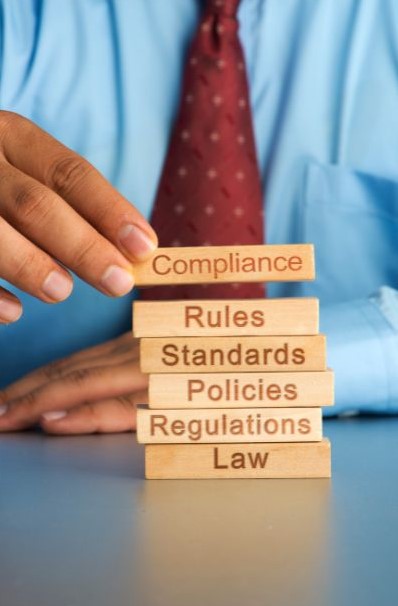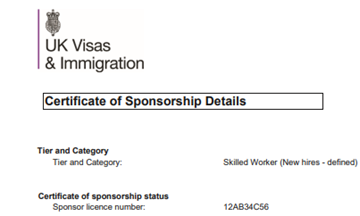Why Are Skilled Worker Visa Applications Being Refused in 2025?
Feeling the Pressure? How Visa Problems Are Hurting Businesses and Their People

If you're sponsoring overseas talent, you know it's not just about filling a vacancy. It's about giving people a real opportunity and helping your business grow with the right skills at the right time.
But in 2025, many companies are discovering how easily Skilled Worker visa applications can fall apart. Even businesses with good intentions and careful plans are finding themselves facing refusals.
When a visa is refused, it isn’t just the candidate who suffers.
Hiring managers are left frustrated.
Projects get delayed.
Candidates and employees feel anxious and sometimes lose trust in the company they hoped to build a future with.
At Immtell, we work with sponsors every day who want to do right by their people but feel overwhelmed by constant rule changes and Home Office expectations.
In this article, we'll explain why applications are being refused, the real impact on businesses, and how you can protect both your people and your company.
The UK Skilled Worker Visa: What Sponsors Need to Know in 2025
The Skilled Worker visa route remains central to bringing global talent into the UK.
But 2025 has introduced two important challenges for sponsors:
- Salary rules have changed, creating different thresholds depending on whether a worker already has a visa or is applying fresh.
- Standard Occupational Classification (SOC) codes were updated in 2024, changing how many job roles are classified.
For sponsors, this means even if you have successfully hired under the Skilled Worker route before, you cannot assume the same steps will work again today.
The Home Office expects sponsors to stay fully up-to-date, and a failure to do so can cost both time and trust.
The Main Reasons Skilled Worker Visa Applications Are Being Refused
Sponsorship Compliance Gaps
Visa refusals often start with the basics.
Incomplete records, unclear job descriptions, poor CoS drafting, and weak sponsor notes can all raise red flags during the visa assessment. In many cases, the problem isn't that the business was careless; it's that the UK sponsorship landscape has changed quietly, and what was acceptable before is no longer acceptable today.
Salary and Job Code Problems
Salary thresholds are one of the biggest traps for sponsors right now.
Following changes in April 2024:
- Workers already granted a Skilled Worker visa before that date (and now extending or changing employers) may qualify for lower salary thresholds.
- New applicants, or those who obtained their first visa under the new rules, usually need to meet higher thresholds.
In both cases, different tables under Appendix Skilled Occupations apply.
Checking the wrong table, applying the wrong threshold, or failing to map the correct job code can result in a refusal, even when the job offer and candidate are otherwise perfect.
The SOC codes themselves have also changed. Sponsors now need to match jobs against the 2024 updates (SOC 2020 codes), not the old codes.
Selecting a code that feels "close enough" without proper mapping can cause the Home Office to question whether the vacancy is genuine, which can lead to a refusal based on genuineness grounds.
It’s a minefield for sponsors without expert support.
Problems with the Certificate of Sponsorship (CoS)
A Certificate of Sponsorship (CoS) must reflect the reality of the role, the salary, the conditions, and the company’s genuine need for that worker.
Even small inconsistencies between the Cos and other records can raise concerns.
We commonly see refusals where:
- The wrong salary is listed compared to the offer letter.
- The duties on the CoS don't match the mapped SOC code expectations.
- Financial maintenance is not certified, exposing the worker to financial requirement checks they can’t pass easily, or more often, simply weren't aware of.
In 2025, the Home Office looks at CoS details more closely than ever before. Rushing a CoS without a full internal review is asking for problems.

Failing the Genuine Vacancy Test
Sponsoring someone is about filling a real need, not creating a role just to facilitate a visa.
The Home Office needs to be satisfied that:
- The role existed before, or there is a genuine need for the new position.
- It matches sector expectations.
- The candidate's experience fits what is advertised.
Even genuine roles can fall foul of this test if the paperwork doesn’t tell the full story. Poorly drafted adverts, generic CoS descriptions, and inconsistent salary offers can all cast doubt, leading to refusal.
Financial Requirement Failures
Sponsors sometimes forget to certify maintenance on the CoS.
That forces candidates to prove personal savings, and if the evidence isn’t perfect, or is presented incorrectly, the visa fails.
This creates unnecessary pressure on candidates, adds avoidable risks, and delays the onboarding process. What is concerning is that when we are asked to step in and help with a new application following a refusal, more often than not, the candidate wasn't aware that they needed to provide evidence of their finances to meet this requirement.
The Real Impact of Visa Refusals on Your Business
When a visa application is refused, the effects echo throughout the business.
- A new starter who should have been onboarding is left scrambling to understand what went wrong.
- Teams waiting for key skills find themselves stretched thinner.
- Hiring managers grow frustrated with the extra workload.
- Candidates lose faith that their future lies with your company.
- In the background, internal HR and mobility teams face extra stress, urgently trying to untangle compliance failures while managing upset stakeholders.
Beyond internal issues, there’s an external risk too. Word travels, and businesses seen as poor sponsors can find it harder to attract top global talent in future.
Sponsorship isn't just a paperwork process. It’s a reflection of how you value the people you bring into your organisation.
A Hidden Risk: When Companies Hand Over the Process to Their People
One growing trend is for sponsors to issue a Certificate of Sponsorship (Cos) and then leave the worker to manage their visa application on their own. On the surface, it can seem like a smart way to save costs and time, which we are all trying to do.
But in reality, it often causes bigger problems:
- New hires, left to navigate the process alone, can make innocent mistakes, causing refusals or delays that slow down onboarding and sour the relationship before it even starts.
- Existing employees extending their visa have to divide their attention between their main job and managing stressful immigration paperwork, which affects both their performance and mental well-being.
In both cases, it creates avoidable delays, costs more to fix later, and risks damaging trust with the very people you are investing to bring on board.
True support means guiding your people through every step, not leaving them to fend for themselves once the CoS is issued.

How Companies Can Step Up and Support Their People
The best sponsors understand that immigration support is part of their duty of care. They build internal systems to check all CoS' carefully before issuing.
They keep their HR and mobility teams trained and up to date on immigration rule changes. And they partner with experienced, regulated advisors who can review and guide the process professionally.
Supporting your people through sponsorship doesn't just create better immigration outcomes; it builds stronger, more loyal teams.
How Immtell Helps You Keep Your Sponsorship on Track
At Immtell, we support sponsors in delivering a better experience for both their business and their people.
We offer:
- Mock Immigration Audits, identifying and fixing risks before they turn into refusals.
- Visa Management Support, taking candidates through the full Skilled Worker visa process with clear, professional guidance.
- Training and Strategy Workshops, giving HR teams practical skills for smarter, safer sponsorship.
All our services are backed by regulated, real-world experience, designed for businesses that want sponsorship to be a competitive advantage, not a risk.
What to Do if an Application Is Refused
A refusal is serious, but it’s not the end.
You may be able to request an administrative review if the Home Office made a mistake. However, in most cases, preparing a new, corrected application is faster and more effective. Speed matters, especially to show candidates that your business stands behind them.
At Immtell, we work quickly to assess the situation, advise on the best next steps, and rebuild trust with your candidates.
Supporting Your People Starts with Strong Sponsorship
Strong UK visa sponsorship isn't just about getting a visa approved. It’s about offering people a future they can trust in, and giving your business the talent it needs to thrive.
Visa refusals are costly, stressful, and damaging. But with the right processes, the right training, and the right support, your business can sponsor smarter, act faster, and give your people the support they deserve.
At Immtell, we're here to guide you every step of the way.


Need help securing your Skilled Worker visa approvals?
Our regulated experts guide sponsors through every step. Protecting your people, your projects, and your reputation.
Our regulated experts guide sponsors through every step. Protecting your people, your projects, and your reputation.









